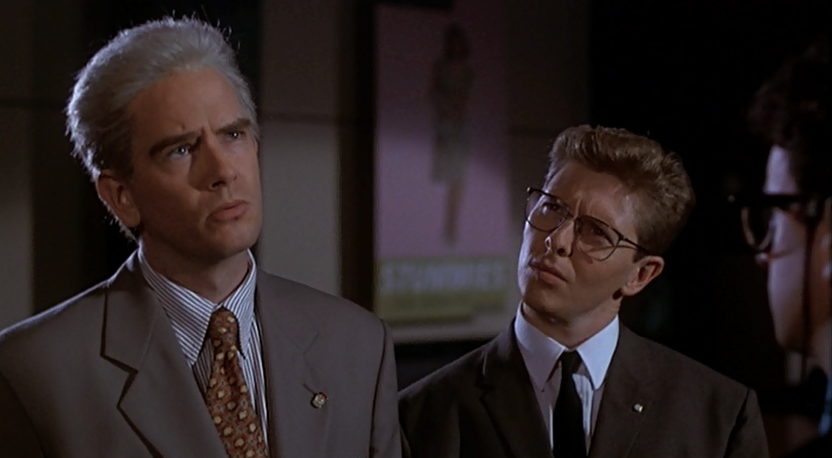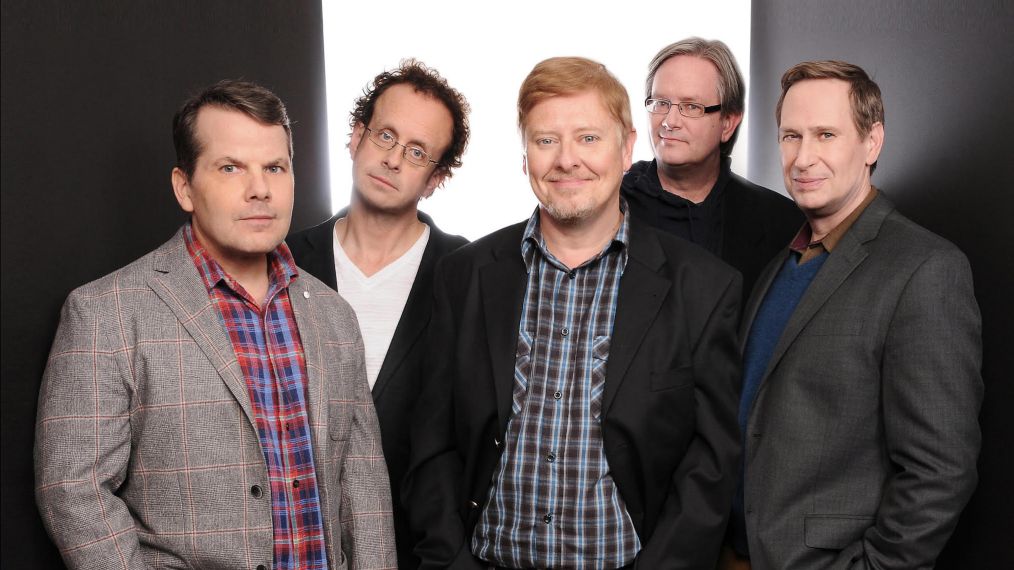Just Kidding
I just read Paul Myers "authorized biography" of The Kids In The Hall. Myers interviewed all the Kids as well as many who worked with them and admired them, so I don't think there's a better book available on the subject. (I'm not sure if there is another book available on the subject).
The Kids In The Hall, if you didn't know, are a comedy troupe of five Canadians, born in the late 50s and early 60s, best known for their TV show which lasted five seasons. They've also done live appearances, a movie and have worked in various other projects individually.
I'm a fan, though I don't consider them as classic as, say, Monty Python--one of their inspirations. And, in fact, their story reads a lot like Monty Python's, just a generation later. Python was five writer-performers (plus an animator) who came together when one writing team (Terry Jones and Michael Palin) started working with another (Graham Chapman and John Cleese) plus a fifth who was on his own (Eric Idle).
In the case of The Kids In The Hall, you've got one duo who worked together in Calgary--Bruce McCulloch and Mark McKinney (a lot of "Mc" names in the troupe)--and who came to Toronto as part of a sketch comedy group The Audience. Once there they met two other guys, Dave Foley and Kevin McDonald, who were in their own troupe, The Kids In The Hall. Like Monty Python, the two teams had different strengths (Foley and McDonald were a bit more traditional while McCulloch and McKinney were a bit more conceptual). They decided to work together--flipped a coin to see which name they'd pick--and soon after, a fifth member, Scott Thompson, joined them.
There were other names who worked with them and fell out along the way. One of them was Mike Myers, who followed his own very successful path. (Author Paul Myers is Mike's brother.) Eventually, the five got a reputation as being one of the smartest, funniest troupes in town. They knew all about Second City-style comedy, but wanted to move a bit beyond it, both grounding their pieces more in reality while also taking them to more absurdist levels.
It was tricky to find enough funding to underwrite the show, but HBO and the CBC both agreed to put in some money, and split up the rights between America and Canada. After a few seasons, HBO dropped out and CBS stepped in. The original show ran from the late 80s to the mid-90s. However, it wasn't until it was rerun on Comedy Central that many caught the troupe (including me).
Reading the book, I was surprised how many routines I remembered. Like Python, their show was a mix of live sketches and filmed bits shown to their live audience. Some of the material that stays in the mind (and is now available on YouTube): the Headcrusher, Chicken Lady, Cabbage Head, Buddy Cole, the Flying Pig, the two cops, the two prostitutes and many others. (One bit that hasn't aged well is "He's hip, he's cool, he's 45"--when the troupe were in their 20s, a hip guy of 45 seemed ridiculous, but now they wish they were that young.)
The show ended after they'd produced 102 half-hour episodes, but the troupe wasn't finished. Not unlike Python, it was time to make a movie. The troupe had often fought, but it was nothing to what happened when they tried to write their film. Dave Foley, who was working on a film of his own (The Wrong Guy) and had been offered the lead in a network sitcom (NewsRadio) didn't seem to be involved, and was rubbing the troupe the wrong way--and vice versa. They had a serious falling out, and while Foley agreed to be in the movie, his participation was minimal.
The film, Brain Candy (1996)--about a pharmaceutical company that develops a mental health drug with dangerous side effects--was a flop, though has since become a cult classic. The story is a bit wobbly, and often it's more intriguing than funny, but it does represent The Kids on a bigger scale, and shows a lot of imagination. However, because it didn't make money, the troupe did not have a film career.
After the movie, the team went off in five individual directions. Foley, as noted, became a TV star. McCulloch got more into directing, helming such films as Dog Park and Stealing Harvard. McDonald worked a lot in TV, including guest shots on Seinfeld, Friends and That 70s Show. McKinney became a cast member on Saturday Night Live and today is a regular on Superstore. Scott Thompson became a regular on The Larry Sanders Show.
But the group never split up. In fact, they patched things up and over the past 20 years have done numerous live appearances. They also did a mini-series in 2010, Death Comes To Town. Unfortunately, it wasn't at the same level as their original show.
Still, it's good to know the troupe is still around. In any case, nothing can take away what they've already done. They're a major influence on the comedy of the past generation, and I'm guessing will continue to have influence as younger people discover them.






0 Comments:
Post a Comment
<< Home